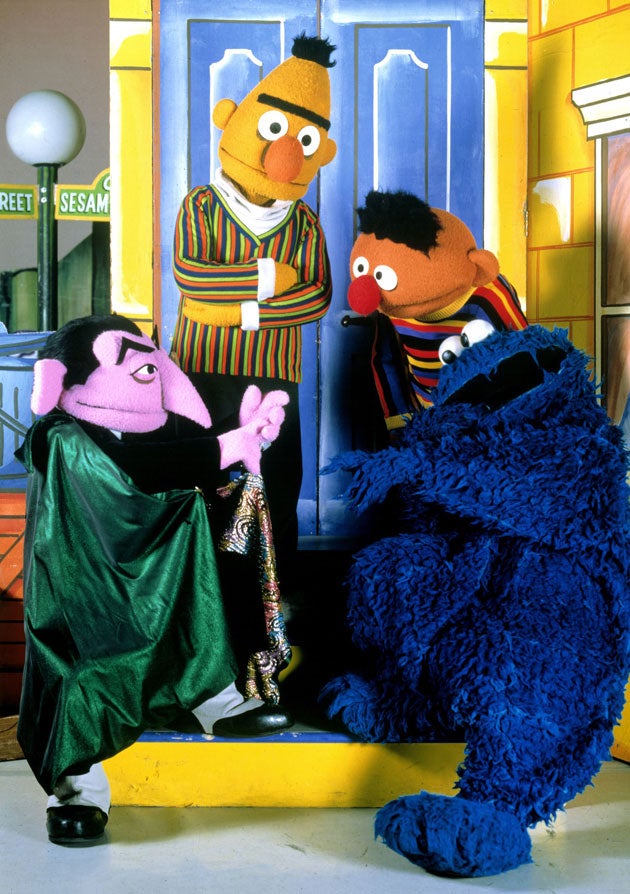Your support helps us to tell the story
From reproductive rights to climate change to Big Tech, The Independent is on the ground when the story is developing. Whether it's investigating the financials of Elon Musk's pro-Trump PAC or producing our latest documentary, 'The A Word', which shines a light on the American women fighting for reproductive rights, we know how important it is to parse out the facts from the messaging.
At such a critical moment in US history, we need reporters on the ground. Your donation allows us to keep sending journalists to speak to both sides of the story.
The Independent is trusted by Americans across the entire political spectrum. And unlike many other quality news outlets, we choose not to lock Americans out of our reporting and analysis with paywalls. We believe quality journalism should be available to everyone, paid for by those who can afford it.
Your support makes all the difference.My eldest geek daughter and I were helpless with laughter the other night, rapt at our screens before another webcast discovery. We had found a brilliant "mash-up": footage of the Sesame Street character Cookie Monster, lip-synching precisely to the Tom Waits song "God's Away on Business". Such a diverting, obsessional labour of love is what we celebrate about the internet - amateur energies coursing through democratic tools, coming to mass attention from nowhere.
But what might the intellectual-property lawyers from Henson Enterprises, or Waits's record label Anti, have to say about such a wisp of joy? Should they be fully empowered to discourage such irreverent bricolage, with punitions and legal threats, as a compromise of their intellectual property? In this comprehensive but relentless book, Robert Levine (an ex-editor of US music business bible Billboard) wants to make us realise that the internet's facilitation of "free culture" - or a world of piracy to some - has to come to an end. His case is that technology companies have built their businesses - whether web-based and advertiser-driven like Google, or integrated device companies like Apple - on the basis of unpriced (or underpriced) content, made possible by the under-controlled web.
Levine has made an very authoritative attempt to substantiate the content-creators' fightback. But his nostalgia for the good old days of the music business also reveals some rather grisly commercial assumptions. For example, one of his problems with iTunes, even though it's a monetised service, is that it "unbundles" the album. The consumer is able to spend less money, picking off favourite tracks - rather than, as before, having to spend more money on a complete magnum opus.
Yet Levine has no appreciation for how this unbundling allows listeners to create their own stimulating playlists, refining their musical enthusiasms. Would this ultimately result in more spending per consumer?
Levine cites studies that say no, against others that say yes - but he also admits there is a general failure of objective market research. Yet it's indicative of the pecuniary, bottom-line tone of this book that even Apple's brilliant and mostly successful effort to commercialise the infinitely copyable is worth his sustained grouch.
What would a "functioning market" for digital culture look like to Levine? A balance of stick and carrot, entrepreneurship and regulation, which he calls "blanket" or "collective licensing". The carrots are well-designed content "services": the current exemplar is the music-streaming service Spotify. We receive a bountiful - but licensed - downpour of music, and Levine thinks it could be extended to other media like TV and journalism, to our screens and headphones. It would "feel like free"; it wouldn't be free, however, because our payment would be subsumed into the rental fees we pay for our information devices. Levine predicts that we would have to accept some price rises in these rents.
The "stick" part is that licenses have to be enforced. Performing Rights Society inspectors already go round radio stations, restaurants and cafes, making sure that dues are paid for playing music. So a software equivalent would regularly monitor the networks - ensuring that some agreed proportion of revenues is returned to the rights-holders.
Levine hopes we can redefine copyright, "the right to copy" (an unenforceable absurdity after ten years of the web), as copyrisk. Like traditional actuaries, gathering together pools of money to insure against the inevitable risk of shipwreck or car accident, the content business needs to find a way to collectively compensate authors and creators for the healthy turbulence and promiscuity of internet usage.
You almost feel sorry for Levine, in all his mercantile passion, when he discovers where these "collective licensing" agreements are already proving most successful: in Northern Europe, from Ireland to Germany, Denmark to Finland. That is, in national cultures where "they socialize any number of expenses that others would view as private. And as anyone involved in health care can tell you", he continues sorrowfully, "what works smoothly in Scandinavia can start fights in the US". His call for a "statutory approach" in his own country seems rather forlorn.
Ian Hargreaves's constructive recent Digital Economy report in the UK would seem to chime with this European style. He suggested a one-stop Digital Rights Exchange, which would help make intellectual property more trackable - and thus licensable - across the expanding wilds of bandwidth. Away from the heavy-metal clangour of "thieves" and "property-owners", it's the filigree of patient, intelligent policy - forged through a boring old stakeholder-driven commitment to a well-regulated mixed economy - that will bring stability to these debates. Which efforts, to his credit, Levine fully endorses.
Incidentally, Hargreaves's report makes an astute and charming proposal. We should recognise the rights of parodists and satirists to recombine digital material, without Matrix-like IP lawyers swooping down to exterminate them. It looks like, at least in this jurisdiction, that Cookie Monster Tom will continue to flap his gums freely.
Pat Kane's forthcoming book is 'Radical Animal' (www.radicalanimal.net)

Join our commenting forum
Join thought-provoking conversations, follow other Independent readers and see their replies
Comments